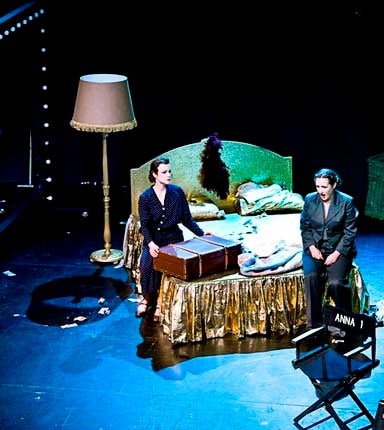The Seven Deadly Sins, HMV Picture House, Edinburgh<br/>Semiramide, Festival Theatre, Edinburgh<br/>BBC Scottish Symphony Orchestra, Usher Hall, Edinburgh<br/>Queyras / Tharaud, Queen's Hall, Edinburgh
Sharp, sexy, sad: Kurt Weill and the ugly reality of trading in erotic capital

Your support helps us to tell the story
From reproductive rights to climate change to Big Tech, The Independent is on the ground when the story is developing. Whether it's investigating the financials of Elon Musk's pro-Trump PAC or producing our latest documentary, 'The A Word', which shines a light on the American women fighting for reproductive rights, we know how important it is to parse out the facts from the messaging.
At such a critical moment in US history, we need reporters on the ground. Your donation allows us to keep sending journalists to speak to both sides of the story.
The Independent is trusted by Americans across the entire political spectrum. And unlike many other quality news outlets, we choose not to lock Americans out of our reporting and analysis with paywalls. We believe quality journalism should be available to everyone, paid for by those who can afford it.
Your support makes all the difference.From Ancient Babylon and 1930s Louisiana the message came: "Pull yourself together!" Strung through the baleful choruses of Semiramide, or slung over Weill's tart facsimile of a Barbershop Quartet in The Seven Deadly Sins, that one exhortation resounded across Edinburgh.
But for Anna I and Anna II, the fractured self at the heart of Weill's satirical ballet chanté, it is an impossibility. Staged in the dusty Art Deco of a former cinema, Kally Lloyd-Jones's Scottish Opera/Company Chordelia co-production of The Seven Deadly Sins was sharp, sexy and bitterly sad. A brisk snap of the clapperboard marked each scene, as Anna I (soprano Nadine Livingston) became director and documentor of Anna II's career (dancer Kirsty Pollock), watched with slack-jawed incredulity and God-fearin' disapproval by their American Gothic family (David Morrison, Iain Paton, Damian Thantrey and Peter Van Hulle).
From slothful ingenue to prideful artiste in a Memphis hoochie-coochie bar, wrathful Hollywood dissident to gluttonous Philadelphia pin-up, lustful Boston concubine to greedy Baltimore heiress, Anna II shows her "little, round, white bottom" for money, her moral compass dissolved by the ugly reality of trading in erotic capital. Yet it is hard-nosed Anna I who is lost at the end, pimp and victim. Singing with lieder-like poise, her gestures mirrored in Pollock's lithe arabesques, Livingston brought pathos to her role, each word crisp over Weill's glossy strings, wailing clarinets and prickly banjo. Under Jessica Cottis, Scottish Opera's orchestra sounded taut, slippery and glamorous. The company may be suffering financially but it is suffering in style.
Nigel Lowery's Vlaamse Opera staging of Semiramide was the first of the International Festival's mainstage operatic imports, a four-and-a-half-hour epic of fitful genius and silly super-titles. ("Your mother's hands are armed!") Despite Alberto Zedda's lickety-split tempi, the first hour dragged as one sketchy character sang something impossible while another did something impossible. Gantries were wheeled on stage by a chorus in fezzes, then turned about and wheeled off again. Then Rossini cranked up the drama, unleashing a bizarre fusion of Gluckian severity and Gothic flummery for the Act I finale.
In Act II it is Arsace (Hadar Halévy) and Assur (Josef Wagner) who are told to pull themselves together. Both are victims of Semiramide (Myrtò Papatanasiu), the Babylonian bombshell who poisoned Arsace's father with Assur's help, believing their son to be dead. Brittle of tone and dead-eyed, Papatanasiu warmed her sound for the exquisite mother-son duet "Giorno d'orrore". Pre-echoes of Verdi were detectable in the male chorus, but for the most part, Rossini's incestuous melodramma tragico reads like a bloated prototype for Donizetti's Lucrezia Borgia.
Redemption came late in Donald Runnicles' performance of Mahler's Second Symphony with the BBC Scottish Symphony Orchestra. This was a brawling face-off between fate and individual. Gritty cellos and basses underpinned the first and second movements, while the klezmer shrieks of the Scherzo were brutally sarcastic. It was exciting but unmoving, the window of benediction kept shut. Karen Cargill's Urlicht prised it open a fraction, principal trombonist Simon Johnson's solo a fraction more. But only in the votive gasp of the Edinburgh Festival Chorus's "Aufersteh'n!" did I feel Runnicles was admitting the counter-argument that colours Mariss Jansons' interpretation from the very first note.
At the Queen's Hall, Jean-Guihen Queyras and Alexandre Tharaud idled elegantly through Poulenc's coquettish Cello Sonata, a work that wears its heartlessness on its sleeve. It's a perfect fit for Tharaud's coolness but too superficial for Queyras's searching musicianship. Watching him play Kodaly's Sonata for solo cello, I was aware of how intently he listens to each melody, the music shapes his playing as opposed to his playing shaping the music. Debussy's Sonata in D minor offered common ground, elegaic solo lines offset by impeccable transparent piano writing. Written for viola da gamba and continuo, Marin Marais's Suite in D minor was the novelty item, in an edition sounding to have dated from Saint-Saëns's dotage. As to the programme notes' bold contention that "the more opaque-sounding cello and grand piano can communicate farther and deeper in concert than the original instruments", phooey!
Next Week:
Anna Picard remembers the Eighties as Rory Bremner's reworking of Offenbach's Orpheus opens in Glasgow
Classical Choice
The BBC Proms nears its finale, with Christian Teztlaff, Lars Vogt, and the Philadelphia Orchestra among this week's performers (Royal Albert Hall, London 0845 401 5040). The four-day Kings Place Festival opens on Thursday and includes London Sinfonietta, Aurora, Ivana Gavric, and Paul Watkins. Kings Place, London (020 7520 1490).
Join our commenting forum
Join thought-provoking conversations, follow other Independent readers and see their replies
Comments